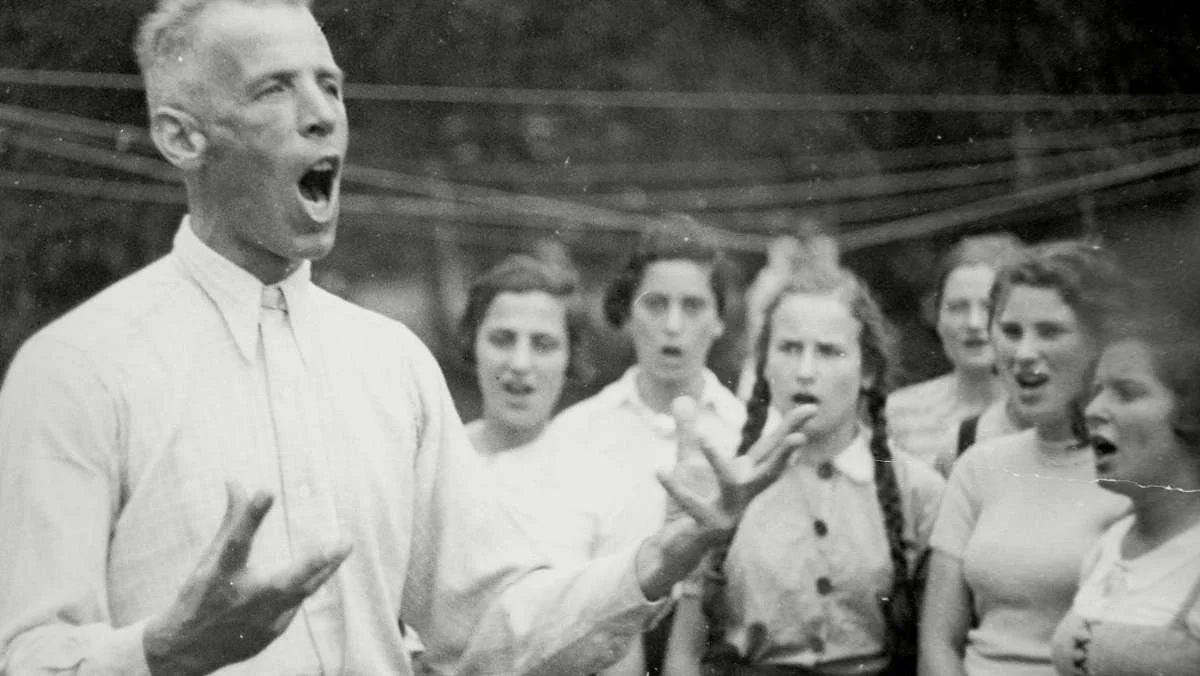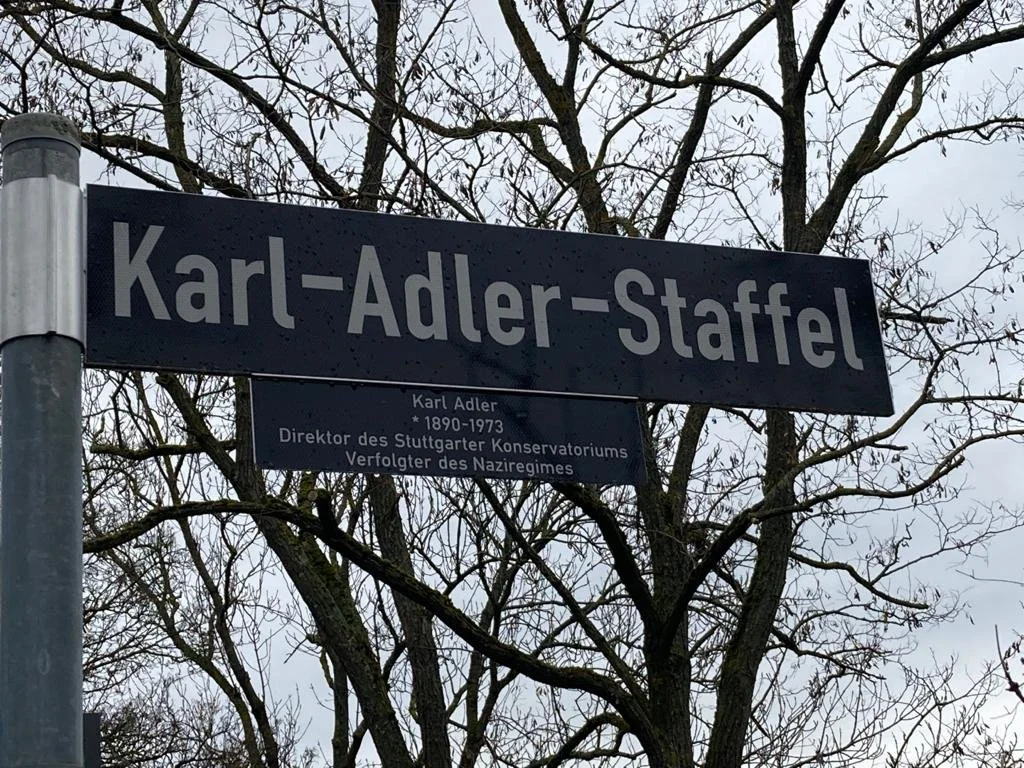The Voice of Karl Adler
For those who missed the previous chapter about Nelson Morris, his children, and grandchildren, I recommend going back to read it. From the Chicago branch of the family came quite a few fascinating, influential, and pioneering figures in their fields. Anyone wishing to explore further will find that most of the names are linked to Wikipedia pages.
And today, we return closer to home, to Germany. This time, with the story of Karl Adler, the husband of Grete Merx.
Karl Adler was born on January 25, 1890, in the small village of Buttenhausen, in the Kingdom of Württemberg. He was the eldest child of Louis and Mathilde Adler, and the big brother to Fanny and Irene. In Buttenhausen, Jews and Christians lived side by side in relative peace, and the deep religious faith of his parents left its mark on him from an early age.
The Adler family was among the oldest Jewish families in the village. They owned a shop that sold hats and sewing supplies, while Karl’s father also served for many years as the community’s cantor. It was in this atmosphere- steeped in tradition but open to the surrounding world — that Karl’s earliest gifts began to shine.
His musical talent revealed itself almost as soon as he could speak. At the age of 12, his voice caught the attention of Theodor Rothschild, the director of the Jewish orphanage in Esslingen. Rothschild was so moved by the boy’s singing that he urged Karl’s parents to send him to the teachers’ seminary in Esslingen- advice they were wise enough to follow.
By October 1908, Karl had already passed his first teaching certification exam, and only three months later, he was examined before the Royal Jewish Supreme Council in the rigorous cantor’s exam. The young man was now qualified to work both as a substitute teacher and as a cantor in a Jewish school. But Karl’s voice carried him further than anyone had imagined.
Determined to pursue his gift, he enrolled at the Royal Conservatory of Music in Stuttgart. There, the doors of the opera world opened to him, and between 1912 and 1915, he stood on the stage of the Stuttgart Theater, performing as a professional singer and beginning the career that would define his life.
School Certificate
After years of study and teaching, Karl Adler founded the New Conservatory of Music in Stuttgart- an institution that quickly grew and became a major center for musical education. Adler emphasized collaboration, placing particular importance on singing, even within instrumental lessons. He promoted the Tonika-Do method to make music education more accessible to broader segments of society, and he established a public music library that expanded rapidly. The number of students grew from 200 in its early days to more than 1,000 by 1932, while the faculty increased from 17 teachers to over 40.
When the First World War broke out, Adler volunteered for military service. A young man filled with patriotism, he distinguished himself with exceptional courage and rose to the rank of lieutenant. Serving as an artillery officer, he was severely wounded in the head in the trenches and carried with him the trauma of the front lines. (He was awarded the Iron Cross and the Honor Cross for Frontline Soldiers for his service in the war, but refused the Federal Merit Cross.) His serious injury ended any chance of continuing a singing career, while the collapse of Germany in the autumn of 1918 was, for him, a deeply painful experience.
By the summer of 1931, Adler had already become a target in the Nazi press, most likely because he was one of Stuttgart’s most prominent and successful Jewish musicians. After Hitler’s rise to power, on March 13, 1933, he was brutally attacked in the street by a group of Nazis who lay in wait and beat him severely. In May of that year, he was forced to resign from the Conservatory he had built with his own hands.
Even after his dismissal, as antisemitic laws tightened and Jews began fleeing Germany in large numbers, Adler continued to bring people together through music — even as the world around him collapsed. In the face of losing his life’s work, he initiated the creation of the “Jewish Art Community” in Stuttgart, a local branch of the “Cultural League of German Jews” (later the “Jewish Cultural Association”). Within a short time, he had organized a large choir and symphony orchestra that performed a rich repertoire. True to his vision of popular education, he also hosted “open singing” evenings, which he personally led. His initiatives spread to other cities, including Hamburg, Berlin, Munich, Cologne, Danzig, and more. From 1935 to 1938, he also served as the music director of the Adult Jewish Education Center, an institution founded at the initiative of Martin Buber to provide learning opportunities for Jews after they were barred from universities and public schools.
On Kristallnacht (November 9, 1938), Adler received a phone call telling him that Stuttgart’s synagogue was in flames. He rushed to his office, which adjoined the synagogue, and managed to save many documents that could not be allowed to fall into Nazi hands. Soon after, he was arrested and interrogated by the Gestapo at the Hotel Silber, then imprisoned in Bussenstrasse Prison together with other Jews. After eight days, he was released — on the condition that he cease all cultural activity.
Upon his release, the Jewish Cultural Community was dissolved, and once again Adler found himself without work. Yet he did not give up. He was appointed director of the “Jewish Center” in Stuttgart, an institution that acted as a liaison between the Nazis and the Jewish community. In this role, he managed to help many Jews emigrate from Germany — all while taking enormous personal risks.
We hereby appoint Karl Adler, Staff Sergeant of the Stuttgart District, to the rank of Reserve Lieutenant of the Field Artillery. By our royal command, we order all of our officers, soldiers, and men to recognize him in his new rank.
Signed: Wilhelm – King of Württemberg
Iron Cross, Second Class
By supreme order of His Majesty the Kaiser and King, the decoration is hereby awarded to Sergeant Adler, 1st Field Artillery Regiment, 7th Battery.
General Headquarters, Homburg Castle, January 1916
Signed: General of the Infantry
On March 25, 1925, Karl Adler married Grete Merx, who was eleven years younger than him. He had met her through his work as a choir conductor. Two years later, in 1927, the couple welcomed their only child- a son named Fritz.
Shortly before the outbreak of the war, Karl and Grete traveled to England to visit Fritz, who in the meantime had been taken in by another family and was studying at a boarding school. Fritz managed to make one more visit to Germany, but in 1938, he was sent to Britain as part of the Kindertransport, the rescue effort that saved Jewish children from Nazi persecution. In 1940, with the help of friends, Karl, Grete, and Karl’s parents received permission to immigrate to the United States. Fritz was meant to join his parents later, coming from England.
But in 1943, tragedy struck: Fritz drowned in the Atlantic Ocean when the ship SS Ville de Tamatave was sunk.
In the United States, Karl Adler began his life anew. At first, he worked part-time in New York as a teacher and choir conductor. In 1942, he founded the music department at Briarcliff College, and in 1946, he became one of the founders of the music department at Yeshiva University in New York, where he served as professor until 1968.
After the war ended in 1945, Adler reconnected with his friends in his old homeland. He worked tirelessly to support those in need — especially individuals who had stood by persecuted Jews after 1933 and now found themselves in need of help. He returned repeatedly to Germany, where he spoke publicly against all forms of discrimination and racism.
Karl Adler passed away on July 10, 1973, in Leonia, New Jersey, at the age of 83.
In the photo: At the memorial ceremony in Buttenhausen, Professor Dr. Adler recited Kaddish, the ancient Jewish prayer for the dead. The names of the members of the Buttenhausen Jewish community who lost their lives as victims of Nazi persecution are engraved on the monument.
The Jewish Cultural Center
Tributes and Legacy
In 1990, a stairway street in Stuttgart was named after him — “Karl-Adler-Staffel.”
Since 2007, a youth music competition in Württemberg has been held in his name- “The Karl Adler Prize”
And at Yeshiva University in New York, a student aid fund was established in his memory- “The Karl Adler Scholarship Fund”
The voice of Karl Adler, like so many voices throughout history, may have been silenced for a moment- but it was never extinguished. It continues to resonate in the generations that followed: through his students, through the memorials in his honor, and through the influence that remains alive to this day.
And I cannot help but think of the parallel to recent events- even today, there are voices that some try to silence, yet in the end, truth is heard louder than anything else.
Shabbat Shalom.








